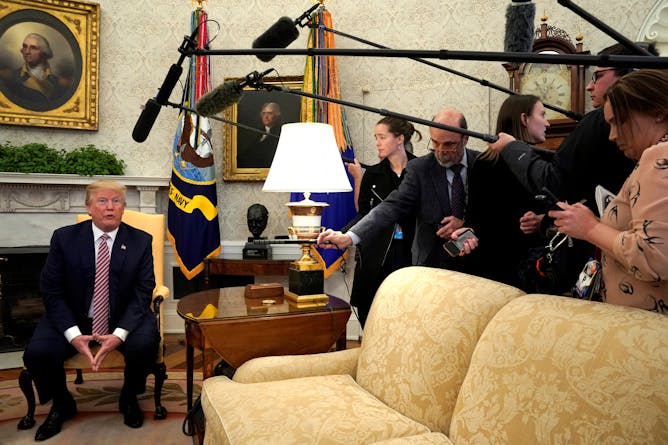|
Donald Trump has strongly criticised American journalists and their work, saying they spread “fake news” and distort information about his administration. Thanks to his anti-media stance, the US dropped two spots in Reporters Without Borders’ 2018 World Press Freedom index: among the 180 countries ranked, it now places 45th. That’s disturbing, writes journalism professor Kris Kodrich – but Trump’s harsh rhetoric is minor compared to the dangers confronted by reporters in Mexico, Turkey, Russia and bottom-ranked North Korea.
In other stories, read about our newly discovered aquatic ancestors and Guatemala’s long history of living with volcanoes.
|

Trump accuses the U.S. “mainstream media” of spreading fake news about his administration. But that hasn’t stopped White House reporters from doing their job.
Reuters/Jonathan Ernst
Kris Kodrich, Colorado State University
Trump may rhetorically attack the media, but the US still ranks 45th of 180 countries in terms of press freedom. North Korea ranks last. And Mexico is the world's most dangerous place for reporters.
|
Environment + Energy
|
-
Andrew Lorrey, National Institute of Water and Atmospheric Research; Andrew Mackintosh, Victoria University of Wellington; brian.anderson@vuw.ac.nz, Victoria University of Wellington
Forty years of continuous end-of-summer snowline monitoring of New Zealand's glaciers brings the issue of human-induced climate change into tight focus.
-
Heather Welch, University of California, Santa Cruz; Jennifer McHenry, Florida State University
How can marine preserves best protect sea creatures that move in and out of them? Two ocean scientists describe new thinking about designing marine protected areas.
|
|
Politics + Society
|
-
Sophie Brockmann, De Montfort University
Fuego and other volcanoes are considered sacred in the Maya culture, but forced Spanish colonisers to move their new capital city.
-
Geetanjali Gangoli, University of Bristol
Even for those that escape, the stigma of refusing a forced marriage separates young women from their family and community.
|
|
Science + Technology
|
-
Robert W. Gess, Rhodes University
The discovery of two separate fossils tetrapod species proves that they lived all over the world by the end of Devonian.
|
|